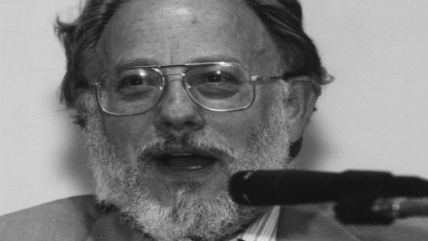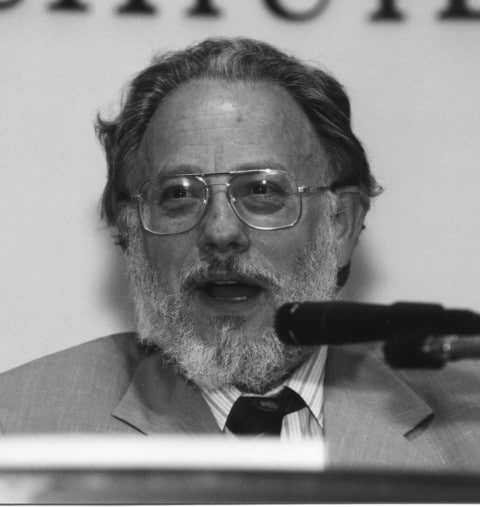Don Kates, R.I.P.
Legal scholar laid the groundwork for the modern revolution in sensible Second Amendment jurisprudence.

Second Amendment scholar Don Kates died this week. The Washington Post article by Eugene Volokh announcing his death rightly calls him in its headline the "father of the modern Second Amendment revival."

When I interviewed Alan Gura, the lawyer who won before the Supreme Court both cases that established the current state of Second Amendment jurisprudence (2008's Heller and 2010's McDonald), for my book Gun Control on Trial, the first writing Gura mentioned as forming the core of his understanding of the Second Amendment as he launched his legal adventure to vindicate it was Kates' seminal 1983 Michigan Law Review article, "Handgun Prohibition and the Original Meaning of the Second Amendment."
As explained in an excellent 2014 essay on Kates' contributions to modern Second Amendment thought by California-based gun law scholar C.D. Michel, "Kates was a nearly lone voice in the constitutional law wilderness….Kates' work, both as a constitutional scholar and criminologist….largely ignited the counter revolution against the American gun control movement" by arguing and demonstrating that the Amendment was certainly intended to protect an individual right to possess weapons.
Kates' article became an ur-source to later articles by more academically well-connected authors, such as Sanford Levinson's 1989 Yale Law Review article "The Embarrassing Second Amendment," that spread the new understanding of that Amendment as guaranteeing an individual right to the more liberal side of legal academia.
As Michel notes, "All the scholarship that Kates indirectly ignited eventually fueled legal briefs filed before the Supreme Court in District of Columbia v. Heller."
Before studying the Second Amendment, Kates did pro bono legal work for the poor in American South, often defending them from corrupt or abusive police. His scholarly work continued a tradition of making sure the otherwise potentially defenseless have the opportunity to protect their rights.
Editor's Note: As of February 29, 2024, commenting privileges on reason.com posts are limited to Reason Plus subscribers. Past commenters are grandfathered in for a temporary period. Subscribe here to preserve your ability to comment. Your Reason Plus subscription also gives you an ad-free version of reason.com, along with full access to the digital edition and archives of Reason magazine. We request that comments be civil and on-topic. We do not moderate or assume any responsibility for comments, which are owned by the readers who post them. Comments do not represent the views of reason.com or Reason Foundation. We reserve the right to delete any comment and ban commenters for any reason at any time. Comments may only be edited within 5 minutes of posting. Report abuses.
Please to post comments


The definition of racism continues to expand:
https://youtu.be/tGPJhyRlcFA?t=8m36s
That's... something alright.
I think the -ist she is looking for is "National"-ist... ?
Carl von Clausewitz to the courtesy phone!
An acquaintance of mine he has a tumblr loser daughter, 20 years old, no job. I got him laughing one day by reminding him of the South Park think "The took arrr jerbs!" He reported the next day that his useless daughter told his daddy that this phrase is racist. Figure that one out.
Nothing to figure. She's too stupid to recognize satire. She thinks South Park is glorifying racist rednecks by having them appear in their cartoons. Sometimes a simpleton is just a simpleton.
There are some things the man said that a wise Latina might disagree with. RIP to a good man.
Good article. BTW,why do they call it Latin America ? Shouldn't it be Spanish America. Or better yet,'Mixed Race' America?
Why do they call it "Latin" America? You ever hear those people talk? They all talk funny and nobody quite understands what they're saying. When the first American explorers found the place they asked "What do you little monkeys call this shithole?" and the natives said what sounded like "Latin America" - but what they were really saying was "La Theen America", which is Mexican for "The Thin America", which is on account of they were all skinny because they didn't have no decent American food there, just tortillas and Chiclets and the little sugar skulls. Don't ask me where they get all the Chiclets from, but, man, they got a lot of Chiclets. (Chiclets is a fun word to say, ain't it?)
It's their own damn fault for not speaking proper English.
"Why do they call it "Latin" America? "
Something to do with the warm embrace of the Catholic Church, I reckon.
There's a Portuguese half of Latin America. See Treaty of Tordesillas (1494).
David Stockman: "Run Away!!!" March refinancing is when the panic hits - the traders sober up and the over-valued markets crash. He's almost totally in cash and gold.
Or maybe not - Stockman asks what I suspect he thinks is a rhetorical question wrt the historically high valuations. Why would you think assets are 25% more valuable now than they were two years ago? That's a good question.
I occasionally place a small wager on a few football games, but what stops me from doing any more than that is the fact that I know every time I see what looks like a good bet there are many other football fans every bit as knowledgeable as me looking at that same proposition and betting the other way. What do they know that I don't know? Sure, most of them aren't any kind of expert on the subject, but they know at least a little, it's not like they just blindly threw a dart at the paper and decided that's the contest they'd like to bet on.
So Stockman may be an expert - but it's not as if the traders were on their way to place a bet on the Giants game and accidentally wandered onto Wall Street and decided to bet on oil futures instead. They know a little something. Maybe they trust Hillary more than Stockman does, maybe they know her price better than he does.
You mean those "investors" who shovel their money blindly into 401k's because they get a tax break? The people who invest on Wall Street because there's little to nothing in the debt markets due to banishment of interest? Investors who have to decide to put their money either into Wall Street or overheated real estate markets? Investors who rely on "stock analysts", the type who were heard to say - when the likes of Worldcom exploded - "who reads the footnotes?"
Of course there are savvy people who take a shot with reasonable educated guesses, but it's a certainty that the entire stock market is breathtakingly over valued due to non-market forces. The ride up of stock values is based on it being largely the only option left to park the massive over-monetization of printing endless new money tied to nothing. The Top Men have been printing and distributing money for three decades now, at a drunken sailor pace. The idea is to dislodge capital "from the sidelines" via debasement, have those dollars float around (see "velocity"), and to stimulate economic activity. Well, whatever dollars they let us keep (temporarily) has to be parked somewhere to stay ahead of that very debasement. And the options have been severely restricted, and so the only space left in the bottle neck is the Stock Market.
cont
But the whole rotten system is about done. The smoke and mirrors are gone, and very soon, as a part of the whole reset, sober analysis of REAL intrinsic value of stock worth will take place. It's not going to be pretty. In short, the stock market is one huge bubble that will have to burst at some point.
It's when Janet Yellin decides she's going to screw President Trump.
"...arguing and demonstrating that the Amendment was certainly intended to protect an individual right to possess weapons."
"..spread the new understanding of that Amendment as guaranteeing an individual right to the more liberal side of legal academia."
Wud'dya mean "new"? Didn't you say just before that that it was the original intent? Doesn't that make it the old (intended) understanding?
What's old is new again.
He probably should have said: "newly re-discovered." Although it was likely new new to the progs.
I believe the word 'correct' would have been the ,well,correct.
Gun control folks will tell you that, back in the day, no one talked about an "individual right" interpretation of the Second Amendment, and they are correct. What they don't tell you is that the term itself was unnecessary.
Back in the day clocks with an hour hand and a minute hand were "clocks." The term "analog clock" wasn't necessary until the invention of digital clocks created a need for a term for "clocks that aren't digital." Similarly, before microwave ovens, "convection ovens" were simply "ovens."
It wasn't until the 1970s and 1980s, when the gun control movement came up with the "collective right" argument, that "individual right" counterarguments became necessary. Before that the Second Amendment was simply a "right," and of course protected an individual's right, just like all the other rights do.
arguing and demonstrating that the Amendment was certainly intended to protect an individual right to possess weapons
He did indeed make that argument. But in addition, and just as valuably, he made the argument that regardless of the Second Amendment, gun control simply would not accomplish the reductions in violence that the early gun control groups promised it would.
Don Kates was one of the few gun-rights writers in the 1970s and 80s. Gun control had been ascendant since GCA 1968, and stayed so until 1986, so he took heat for his work.
He was one of the first "liberals" who started anti-gun, studied the issue, and "saw the light." A big part of the value in what he published was to other, reasonable researchers who met him with skepticism, but were won over when their own studies confirmed his.
For a lot of us who were already trying to drain the swamp, "The Red Book," Restricting Handguns: The Liberal Skeptics Speak Out, (1979) was the first breath of fresh air in a long time.
Vaya con Dios.